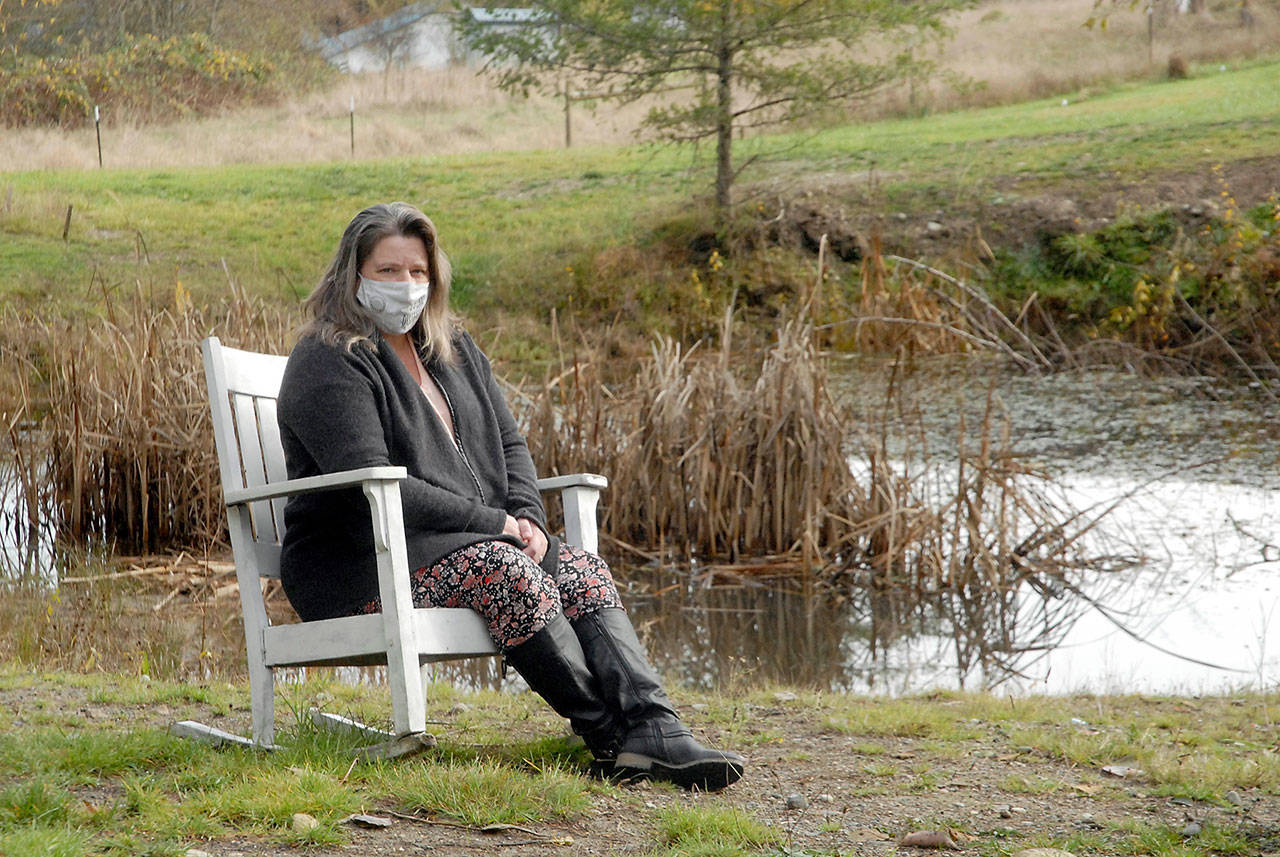After a long, dark November, Laura Dotlich is stepping out into the sunlight.
She returned to her job — medical-surgical nurse at Olympic Medical Center — after weeks in COVID-19’s grip. After OMC’s Employee Health department cleared Dotlich to come back to work this Thanksgiving week, she celebrated the holiday with her husband Matt, with just a small Butterball turkey for the two of them.
And Dotlich, 48, offered a message she hopes will protect people as they head into the winter.
“I’ve been a nurse 28 years, and I love my job,” she said just before her first day back. Dotlich needs to earn a living, yes. Just as important: “I want to help my team. Everyone is just struggling.”
This ordeal can come to a close, Dotlich said, if we practice a particular form of kindness.
On Nov. 4, Dotlich worked her 12-hour shift and felt fine. In the wee hours of the next morning, a deep-chest cough woke her and, depriving her of breath, sent her to the emergency room. There was no treatment for the cough; she was tested for the coronavirus and sent home.
Dotlich got the positive result at 1 a.m. the next morning. As her descent began, she kept a kind of diary on her Facebook page, not only a symptoms snapshot, but also a plea to friends and family members across the region.
“I haven’t felt this sick since I had meningitis 20 years ago. My throat and lungs are on fire,” she wrote Nov. 7.
“I am exhausted but I can’t sleep. I am hot and cold at the same time. I am dizzy when I stand … I can’t talk very well. Am calling the doctor to see what they want me to do next.”
There wasn’t much doctors could do. The ensuing days brought pain from head to gut, and Dotlich’s posts ended with one refrain.
“Please think of others. Wear your masks. Social distance, and use good hand hygiene,” she wrote. “Please be kind to others.”
As she entered her second week of illness, Dotlich’s friends and colleagues expressed their support on Facebook, and she fervently thanked them — for offering to run errands, sending flowers and especially for taking safety precautions.
“The people who are out there, taking other people into consideration — keep doing that,” Dotlich said in an interview.
“Keep doing that, because that’s what’s going to save us.”
In her Nov. 12 diary entry, Dotlich sought to address questions about how she caught the virus. She wrote that she cannot pinpoint the moment of exposure, adding that whenever she goes out, she stays masked, sanitizes her hands and keeps 6 feet away from people.
Yet “me wearing my mask does not protect me from you. It takes two to tango in the Covid Dance,” Dotlich wrote.
She noted that when you come in contact with an unmasked, infected person — possibly asymptomatic and unaware they’re carrying the virus — the transmission is all too likely.
By mid-November, Dotlich started to feel better, but then slid backward. It was hard to breathe, and her chest hurt — a lot.
Dotlich is a nurse who knows how to calm herself, but her usual tactics were no match for this. Aware of COVID’s potential effects on the heart and lungs — many patients face long-term harm— she went again to the emergency room. A prescription for steroids has helped; Dotlich said she can only hope she’s one of the lucky ones without permanent damage.
Noting the U.S. death toll of more than 265,000, she added that it doesn’t include the “long-haulers” with COVID-related heart conditions.
On Nov. 16, Dotlich took a break from her COVID diary to post a no-pulled-punches plea from Dr. Mike Maxwell of Port Angeles’ North Olympic Healthcare Network.
We’re all exhausted by this pandemic, and wishing we could gather for the holidays, Maxwell writes.
“The cruel irony,” though, is that we’re much more likely to catch the coronavirus from a loved one or friend we trust than from a stranger, he said.
“We let down our guards … hug, dine and socialize in close indoor spaces. That is where we are seeing the virus spread like wildfire.”
In mid-November, Clallam County’s COVID-19 case count reached 332; Jefferson County had 116 cases reported. In the days since, Jefferson has reached 160 infections and Clallam 487. Over the past four months the virus has killed three North Olympic Peninsula residents.
“As we share our companionship, we share the virus” at holiday gatherings, Maxwell writes, “and end up risking illness or death for the very people we care about the most.”
Connect by phone or video instead, and “if we do this right, this will be the only time we will have to.”
Unless the tide is turned, Maxwell writes, the health care system will be overwhelmed, and front-line workers — such as Dotlich and her nurse colleagues — will suffer crushing fatigue.
For her part, Dotlich expressed gratitude for her Thanksgiving just with Matt. She’s missing her two grown daughters, though, and hasn’t hugged them since last March.
“I’m not going to put them at risk,” she said.
Dotlich is grateful too for her co-workers, and for recovering from COVID so she can rejoin them.
“Our amazing team,” she wrote, are “overworked, scared, furious.
“I don’t want to let them down any longer by not being there to fight. I will fight. Please, if you haven’t yet, find it in yourself to believe it and join the fight to save others.”



